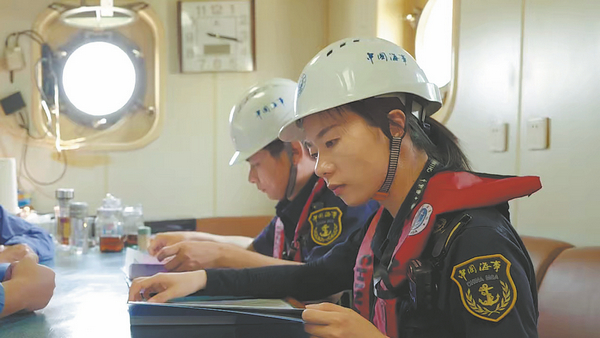

Zhan's involvement in multiple search and rescue missions changed her perception of maritime rescue operations. Before they can enjoy the knowledge that they have helped save people, often at the very last moment, rescuers have to deal with the pressure of searching the vast, featureless ocean for signs of life.
"Still, every additional effort we make gives those in distress another chance of survival," she says.
This belief was borne in late 2015 when a fishing vessel capsized in the Yangtze River's estuary area, leading to nine people going missing. As third officer, Zhan assisted the captain with on-site coordination.
"Our first scan of the vessel detected no signs of life. As we were about to depart, our boatswain took the risk of jumping onto the overturned hull for a final check, and he was able to hear a survivor," Zhan says. "The captain immediately requested assistance from the maritime rescue center, and after efforts by all parties involved, we successfully rescued a fisherman, who had been trapped for 36 hours."
In January 2018, she faced one of her most challenging missions when the Sanchi, a tanker carrying 110,000 metric tons of highly flammable condensate oil, collided with another vessel in the East China Sea and caught fire. By then a second officer, Zhan was urgently recalled from leave.
"As the on-site command vessel, we had to get close to the stricken ship for an inspection," Zhan says. "We had multiple tasks — rescuing people in distress, controlling the fire, and monitoring oil spills. It was a significant challenge and required us to balance our own safety with coordinating 32 surface and air rescue units, both domestic and international."
A clear mind was needed.
"Emotions can cloud your judgment, so I've learned to remain dispassionate when lives are at stake," she explains. "You can reflect on the tragedy later; but in that moment, it's essential to be calm and collected."
The operation took 117 days to complete.
Such intense situations have honed Zhan's ability to analyze calmly, respond coolly, and develop rapidly as a maritime professional. In 2020, she was promoted to chief officer, and given command of the deck department and crew.
Three months ago, she reached her biggest career milestone yet, not only becoming captain, but also the first female captain of a public oceangoing ship in China.
"That first time I took the Haixun 01 into port as captain, I felt an incredible sense of accomplishment," she says. "Precisely maneuvering a vessel this size between other ships, while factoring in the wind, currents, and everything, is an immense challenge, but one I relish."
According to a 2023 report on the development of seafarers, there were nearly 2 million registered seafarers under the age of 65 in China at the end of last year, with women accounting for approximately 15 percent. While acknowledging the unique challenges women face as a minority in the maritime sector, Zhan says that gender is not a factor in her work.
She notes that the greatest pressure probably comes from the attention she receives as one of the few women in the field.
"When I first started, I had to find a way to integrate with the team. My first step was to be accepted, then to achieve results, and gain recognition," she says, recalling her early days onboard.
She argues that the job itself is gender-neutral.
"Being male or female isn't the determining factor. We should respect individual differences. Not all men are suited for work onboard, nor are all women unsuited. What matters is their passion for the work and how well it aligns with their abilities."